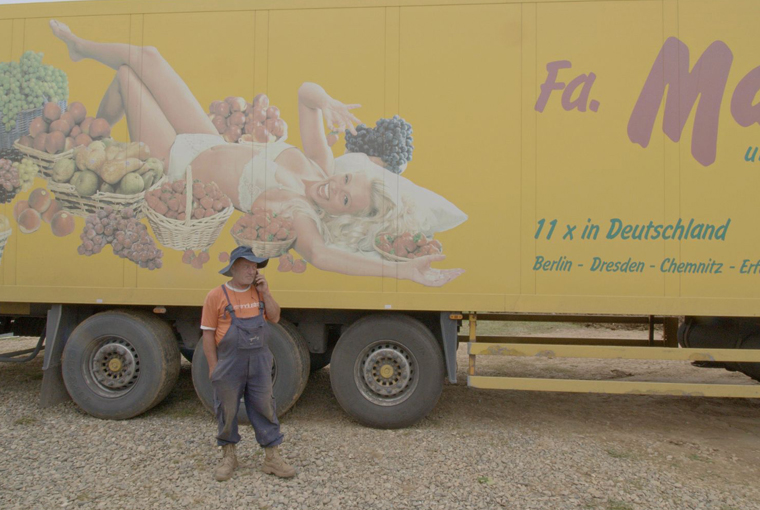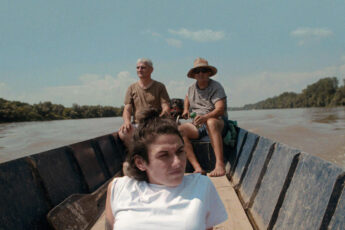Where Poppies Blow
Elene Mikaberidze’s Blueberry Dreams (Lurji Motsvi, 2024)
Vol. 147 (September 2024) by Konstanty Kuzma
In her feature-length documentary Blueberry Dreams, Elene Mikaberidze portrays a family’s attempt to secure a new existence for themselves by putting their hope in a blueberry farm. With the help of a state-funded credit program, they buy land in the Georgian region of “Samegrelo” and build the rudimentary farming infrastructure necessary to grow the small fruit and make a profit from it. Their land is fertile, and the lot are closely knit. Ever optimistic, the family patriarch works the soil each day in the hope of being rewarded for his hard labor. Meanwhile, we see the two sons exploring their surroundings as they run, bike, swim, play, and wrestle. During evenings, the whole family gathers around the kitchen table with or without electricity, switching back and forth between banter and serious discussions about the many issues they face. Despite these issues, which relate to their dire economic outlook and the military threat lurking behind the Russian-secured border to the separatist region Abkhazia near which the family’s land is situated, Mikaberidze’s film is a story of hope. As the English title suggests (the original Georgian title simply translates to “Blueberry”), it gives voice to the dreams and wishes of ordinary people trying to live their lives despite the madness surrounding them. It is only gradually that viewers are partly awakened from their slumber in which sheer will thwarts all challenges, military and otherwise.
Towards the beginning of the film, we see family father Soso guiding his sons and wife through their joint land, literally planting the seeds for his blueberry farm. As the film progresses, the crops will grow and so will the children. With each step in this developmental story come new challenges and hopes. Blueberry bushes can take several years to finish maturing, meaning that both the number of fruits they can carry and the amount of shade they will create only increase with time. Not being a farmer by education, Soso must gain experience with agriculture in general and blueberries in particular. As for his elder son Giorgi, who is in his teens, the question of what to do “later”, and whether he even has the choice of leaving their land behind, becomes ever more pressing as the film progresses. A further stress test is introduced by way of the television, which is always on, and which quickly becomes monothematic as it begins to emit updates on the Russo-Ukrainian war (following Russia’s full-scale invasion in 2022). For a family with ties to now-separatist Abkhazia and living near its de facto border, which is secured by Russian so-called peace troops following a Georgian-Abkhaz war (1992-1993) and a Russo-Georgian war (2008), the war reports spell bad news, raising the fear that their region will be next.
Of course, life goes on even in times of existential threat, as it must. The film is related around a series of vignettes in which everyday scenes of playfulness and loving family interactions fill in the spaces in between farming routines. They are scenes of warmth and strength that Mikaberidze is genuinely interested in. While some scenes convey the presence of the camera – as when the two adolescents discuss what they would do with the blueberries if their father was not there – others seem like they could genuinely have been taking out of a day of the family’s life, as when the two boys wrestle and their mother Nino ultimately gets involved too. There are also comical moments in which the two boys – Giorgi and Lazare – make fun of their father’s patriarchal demeanor while somehow managing to remain respectful and loving. Being hopeful in whatever situation the family face may be a practical necessity, but that parents Soso and Nino even have the energy to remain positive appears to stem from their largely harmonious existence with each other and their children.
Periodically, through such scenes the geopolitical danger lurking behind the border nearby is forgotten, yet it is soon replaced by economic challenges, as Soso and his family struggle to sell the blueberries to be able to cover some of the money they took out from the bank. Their house – which finds itself in an unfinished, desperate state – is not even theirs. “Everything you see is mortgaged,” Soso reminds Nino. But gaining profit from the harvest turns out to be harder than anticipated. The family’s difficulties are not limited to their inexperience or the poor weather during their first year of blueberry farming. A major issue stems from state initiatives that have caused an overproduction of blueberries. According to data by the US International Trade Commission and the International Blueberry Organization, in 2021 the Republic of Georgia produced 238% of the amount consumed domestically. Yet small farmers have few options to access foreign markets, ultimately leading to low prices and minimal profit margins for farmers like Soso. Towards the end of the film, we watch him hiding away in the shade, phone in his hand, in search of potential buyers, only to be redirected to a man he has already sold previous batches to.
Scattered throughout the film are hints at small-scale farmers being lured with false promises. Time and again, Mikaberidze films bank billboards promising them cheap loans and simplified processing. After single-day training, they are expected to come up with a viable business plan and turn the colorful images of farmers picking ripe blueberries into reality. Ultimately, farmers like Soso bear the biggest risks themselves – bad weather, military conflict, pests, overproduction, export barriers, inexperience, and own mistakes. Sensing impending doom, Mikaberidze has gone so far as to breach the boundaries of documentary filmmaking by setting up a project page on ShareDoc, through which viewers can financially support the subjects of their favorite documentaries. 1755 Euros have been raised for the family portrayed in Blueberry Dreams as of 13 January 2025.1
In an interview during DOK Leipzig, Mikaberidze has stated that she deliberately completed her film before the parliamentary elections in 2024 to draw attention to the government’s inaction on cases like that of the family she befriended while completing her project.2 In the context of today’s anti-government protests, which were motivated by the conducting of unfair and manipulated elections in October 2024 and brutally cracked down, this may read like a damning statement for the Georgian Dream party and an anticipation of their showing their true face. After all, the state nudged farmers to take loans, only to leave them to their own fate. In other words, it is a typical case of not following through on one’s promises, which the Georgian government is currently also being accused of in the context of its geopolitical positioning. Constitutionally and rhetorically bound to seek integration into both the EU and NATO, Georgia’s prime minister Irakli Kobakhidze had suspended EU accession talks in late November. Though Kobakhidze later denied halting EU accession, the statement angered the opposition and helped grow the hitherto scattered anti-government demonstrations into a full-blown protest movement.
Yet, one should not be too quick to connect both phenomena. That the current government has disregarded its official foreign policy should not belie the fact that the issue of border villages and internally displaced persons in Georgia has never been easy, and that there was never a Georgian government willing to focus on their demands and grievances. Isn’t the example of Soso, survivor of three heart attacks, and his beloved and loving family, the story of the ultimate reliance of the weak on themselves? Is it not proof that when push comes to shove, no state is willing to risk large sums of money or strategic interests for people living on the frontline? Is it not proof of the fact that for local communities like the one this family lives in, the state brings more trouble than viable solutions?
- Blueberry Dreams. Share Doc. https://www.share-doc.org/d/71001 [Accessed on 13 January 2025]. ↩︎
- Interview Blueberry Dreams. YouTube https://www.youtube.com/watch?v=HMOlsjzpX8M [Accessed on 13 January 2025]. ↩︎




Leave a Comment